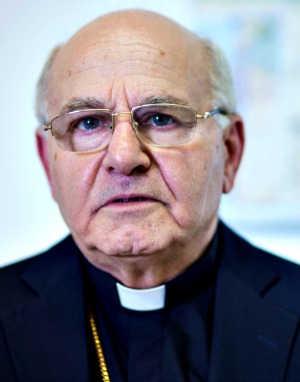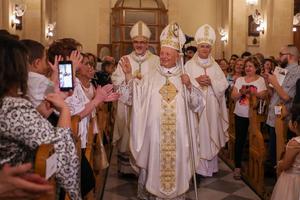Archbishop Says Christians' Help Can Make the Church Flourish in Aleppo
Melkite Greek Catholic Archbishop Jean-Clément Jeanbart described a Church alive, but told the Register it needs partners for its ‘Build to Stay’ movement.

BEIRUT — Christmas came to Aleppo again, this time with joy and hope for the future.
Three days before Christmas, five years of brutal warfare in Aleppo ended, as the last busload of rebel fighters evacuated the eastern half of the city. Once more Christians raised up a Christmas tree in the city and filled the churches.

The mood of Christians had at last changed. It was a “very good Christmas.”
“People were relaxed and happy for the first time in five years,” said Archbishop Jeanbart, speaking over the phone with the Register from the Melkite Greek Catholic Patriarchate in Beirut, Lebanon. People had the courage to go out into the city. He said Christians, Catholic and Orthodox of all denominations, celebrated the Christmas season together with banquets.
“They feel that something good is coming round,” he said.
The archbishop and his flock have suffered together through the destruction of their city, enduring hunger and misery, sometimes under siege. Many have lost their neighbors, and many times he has asked the Holy Spirit to give him the right words to say, when it seemed nothing could be said.
Archbishop Jeanbart remembers the many people killed, particularly young people, including children, from the bombings and shelling. Swathes of the city look like Hiroshima after the atom bomb. Many of the city’s ancient archeological treasures are destroyed. Most of the city's western half that had been under government control, however, appears still intact enough to be habitable.
But the archdiocese itself has been hit hard. Catholic schools and other projects were destroyed. At one point, his archbishopric, the Cathedral of the Dormition of the Virgin Mary and the adjoining buildings and residence, became the front line of heavy fighting. A massive rocket bombardment devastated the cathedral compound while he was there — he said it was one of the few times during the war that he faced the immediate danger of death.
Painful Exodus
The deepest pain for the archbishop — the one that has racked him with guilt and loneliness — has been the exodus of Christians from his city and the rest of Syria. According to the archbishop, Aleppo had 165,000 Christians before the start of the war in 2011. Today, by his count, it has close to 50,000 Christians. For Christianity to remain in Aleppo, he said, families need to have hope: They need homes to live in and jobs to provide for their children.
And at 73 years old, giving Christians “confidence and hope in the future” is now Archbishop Jeanbart’s lifework. He wants them to know that they will have a good future. And the seeds of the rebuilt and renewed Church in Aleppo have already been planted. What it needs are partners, and the archbishop is asking Christians everywhere to join the Christians in Aleppo and Syria, to pray with them and sustain the efforts with their financial assistance. The archbishop said that their Muslim neighbors, whom they respect, have the Gulf States pledging to aid them. The Christians have no such state sponsors.
They have only the kind generosity of the universal Church to ensure “that we succeed in continuing the life of the Church in Syria.”
The archbishop pointed out that the entire Church owes a great debt to the faith of the Church in Syria. Syria’s Christians stand witness to 2,000 years of faithful Christian life, ever since St. Peter preached the Gospel on the day of Pentecost. Many of the 3,000 converts that day were Syrian Jews who brought the Gospel back to their communities and spread it through the region. These first Christians gave the faith to St. Paul, turning the Church’s greatest persecutor into its most eloquent evangelist. The land is baptized with the blood of martyrs — old and new — and has produced countless saints.
“This land is a holy land,” Archbishop Jeanbart said.
A Church Alive
And the Church in Aleppo has life. Archbishop Jeanbart explained that they must create a “new generation” of Christians. They have already been building up the quality of their families, their schools and churches, helping the flock become better witnesses to Jesus. The foundation for a “new Church” in Aleppo is already being laid down.
For one thing, young people have responded generously to his call to have children, so they can raise up good Christian families. Many people, he said, were afraid to have children, due to the war. “Why would a person bring a child into the world at this time?” was the common thinking. But he encouraged young people to have faith and said the Church would help take care of them.
And so his archdiocese devised a program, where it would sponsor newborns and help with the children’s needs for their first four years of life. Archbishop Jeanbart said the program has so far succeeded: Last year, his church celebrated the birth of more than 100 children. These newborns have spread hope in the future.
“More and more families are now no longer afraid to have children,” he said. “And I’m happy for them.”
Parishes in this “new Church” have also become real centers of Christian community life. Archbishop Jeanbart told his priests he wanted them to host celebrations every one to two months to give their people “joy and energy.” Often, the celebration is a community banquet, or concerts and theatrical shows. This past Christmas season, they held celebrations for children, families and the elderly.
He also wants to channel the social genius of Aleppo’s women. He has begun to see that women’s clubs are set up in the churches, so the women can socialize and organize themselves over coffee, movies and lectures on various topics and then find ways to support each other and their families.
Life, Hope, Joy — and Ideas
With the rebuilding of his Church on the shoulders of a septuagenarian, Archbishop Jeanbart reflected that he feels as alive as the day he began his priesthood or his episcopate. When the burden grows heavy, “I go say a few prayers, and then I feel full of life, full of hope, full of joy — and full of ideas!”
The archdiocese already has 22 help programs under way, by his count; a number of them are funded by Aid to the Church in Need, the Knights of Columbus and Catholic Near East Welfare Association. These programs range from schooling, scholarships, food, financial assistance, providing heating units, potable water and paying electric bills.
While the immediate humanitarian aid is ongoing, Archbishop Jeanbart said the “most important project” is the long-term rebuilding of Christians’ homes and businesses through the “Build to Stay” movement. He has anywhere between 50 to 70 volunteers working on this project with him, because these volunteers believe the most important work now is making sure Christians have houses with furnishings to call home, businesses to run and the skills to make their livelihood. The archbishop said the project recently handed out 65 no-interest loans to 65 young people who will rebuild their lives and then pay the loans back “as they can,” over the course of several years.
Archbishop Jeanbart just does not have the Christians remaining in Aleppo in mind with “Build to Stay,” — he also wants to help those Christians who fled Syria and are living now in poverty elsewhere. Many of these refugees, he said, were Syria’s middle class, but now have no work, no income and nothing to eat, living far from home. He wants Christian refugees to know that their home, their Church and their community in Aleppo is waiting for them. At some point, if the Melkite archdiocese gathers enough resources, it will try to help provide people who cannot afford the travel costs a way back to Aleppo. The archbishop said there will be opportunities for work, because Syria — and Aleppo, its economic heart — will have to be rebuilt.
“If families come back,” he said, “it will encourage people to stay and others to persevere.”
Christians Key to New Syria
The “Build to Stay” movement is not just important for keeping the Christian life alive in Syria. The movement’s success, Archbishop Jeanbart pointed out, will benefit Syria, because the Church has an essential role to play in restoring civil society in Syria. The stronger the Christian presence in Syria, the stronger the Christian witness that can shape civil society and reconcile the divisions of war.
In Syria, he said, evangelization has to take place “through friendship.” Each Christian, through his goodness, charity, open-mindedness and constancy, “must show them what it is like to be a Christian and show them Christ.”
This means the Melkites have to rebuild and fund their Catholic schools. Right now, Archbishop Jeanbart said, the archdiocese is providing 1,100 scholarships to the students of Christian families that do not have the means to pay. But the schools benefit more than Christians — they also form many Muslim students from families who enroll their children in Catholic schools because they want their children to have the excellence of Catholic education.
“We have many moderate Muslims,” he said, noting that the imam of Aleppo recently invited him and other Christian leaders to a tea party with other Muslim sheiks. Together, they are building the new Syria.
Over the next few months, the archbishop hopes to restore the cathedral in time for Easter. He said it will be “a good sign of hope to everybody.” It will also be a sign of Aleppo’s resurrection.
“The city is ours, the land is ours, Syria is ours, and we have to continue this presence because it is a holy land. Syria is a holy land,” he said. “If I can give my life for that, it will be worth it.”
Peter Jesserer Smith is a Register staff writer.
INFORMATION
Individuals wishing to donate to Archbishop Jeanbart’s “Build to Stay” movement may donate here through Aid to the Church in Need. They must specify their donation is for the Melkite Aleppo Archdiocese’s “Build to Stay” movement.
- Keywords:
- aleppo
- aleppo archbishop
- archbishop youhanna jeanbart
- persecution of christians
- peter jesserer smith

















